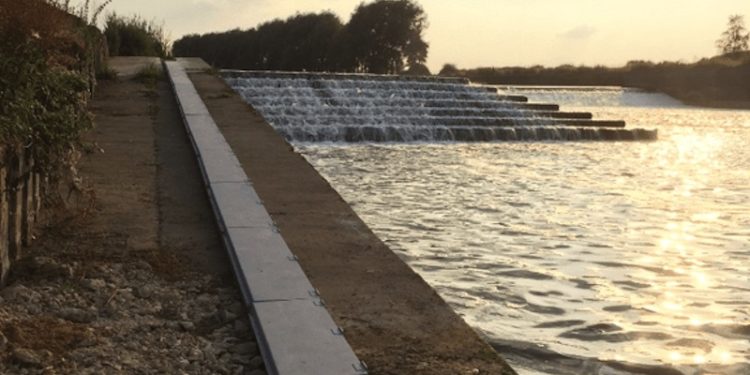Work has been completed to enable endangered eels to make their way up the River Trent as part of their epic 3000 mile journey from Bermuda. In a partnership project, a special eel pass has been installed on Hazelford Weir on the River Trent, between Nottingham and Newark.
The European eel has a life cycle that starts as eggs in the Sargasso Sea near Bermuda and spends 18 months floating on ocean currents towards the coasts of Europe and North Africa. Eels enter rivers and lakes and spend anything from five to twenty years feeding and growing into adult eels. Their journey is interrupted only when they come to obstructions, such as dams, weirs and lock gates.
According to the Sustainable Eel Group, these barriers are part of the reason that the European eel, once thriving across Europe and the UK, is currently classified as critically endangered. Numbers of the eels, which have also been adversely affected by climate change, destruction of habitats and illegal fishing, have declined by around 90% over the past forty years
In an effort to reverse the decline partnership projects are installing a number of eel passes at weirs on the River Trent. The passes act like ladders enabling the eels to make their way over the weirs.
Hazleford Weir is owned by the Canal & River Trust, which commissioned Fishtek Consulting to design and install the pass, with help from the Sustainable Eel Group and the Environment Agency.
‘Eels are an incredibly important part of what makes our waterways so special. They feed on water bugs and dead and decaying animals – helping to recycle nutrients – and are also an important food source for some of our best loved species such as otters and herons,’ said Nick Baggaley of the Canal & River Trust.
‘We’re delighted to give the eels a helping hand as they make their incredible journey. What’s really exciting is that the pass at Hazelford is already being used and hopefully we’ll see many more eels making their way up the Trent.’
Funding for the Hazelford pass, along with a similar one at Belmoor Lakes near Retford, came from EDF Energy. These are part of an extensive programme of work underway across Europe to help restore eel populations by restoring wetlands and removing barriers to the eels’ migration routes.
‘We wanted to do our bit by providing the eel pass on Hazelford Weir. We have enjoyed working alongside many dedicated local partners who are all determined to support and improve the eel population,’ commented Martin Cheetham, Plant Manager at EDF Energy’s West Burton A Power Station.
‘It is fascinating to understand the role that these passes will play in opening up new habitats for eels. I am very proud that West Burton A and Cottam are supporting these projects which will hopefully start to see a reversal in the decline of the eel population.’
Shortly after the pass was built, Fishtek staff saw and filmed an eel using the pass.
‘We are delighted to have worked with the Sustainable Eel Group, EDF Energy and partners in the construction of an eel pass at Hazleford Weir and given Environment Agency approval to the project. Getting past structures, such as the Hazleford Weir, is key for the survival of the eels and it will make a real difference to their ability to travel further upstream to reach habitats suitable for them to grow,’ said Louise Cresswell, East Midlands Area Director of the Environment Agency.
‘The eel pass will also increase their chances of returning to the sea to spawn in subsequent years and, with numbers currently so low, the eels need all the help they can get if we’re going to keep this fascinating species in our rivers. Eels also benefit the local biodiversity so this project to help boost their numbers is a welcome development.’









